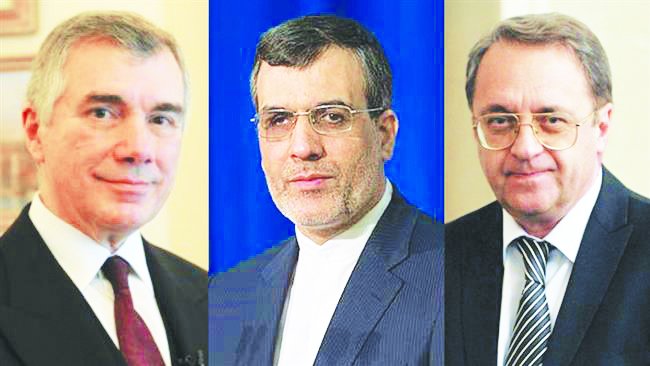Iran, Turkey, Russia huddle in Moscow on Syria

TEHRAN – The deputy foreign ministers of Iran, Russia, and Turkey huddled in chilly Moscow on Friday as the troika is making last-ditch efforts to hash out differences over the Syrian crisis in the run-up to the Astana talks due to take place on Jan. 23.
While the meeting was held behind closed doors, a running theme should have been working out an agenda for the Astana talks.
Iranian Deputy Foreign Minister Hossein Jaberi Ansari sat down with his Russian and Turkish counterparts Mikhail Bogdanov and Ahmet Unal Cevikoz for probably the latest rounds of trilateral negotiations on the Syrian crisis, on for five years now.
Prior to the session, Jaberi Ansari and Bogdanov had met for a final round of consultations, according to the official website of the Russian Foreign Ministry.
“The two diplomats stressed the importance of maintaining close dialogue between Moscow and Tehran on the Syrian crisis and on other current issues of the regional agenda,” a statement released by the Russian Foreign Ministry said on Friday.
In a separate development, the Iranian diplomat held a telephone call with Syrian Deputy Foreign Minister Faisal Mekdad on Sunday, discussing the latest developments vis-à-vis the Astana talks and the Friday trilateral consultation in Moscow.
The high-level political exchanges between the three regional powerhouses come after a ministerial-level meeting in Moscow on Dec. 20, which resulted in declaring a promising statement on the situation in Syria.
Also, the regional troika declared intention to halt the civil war in Syria through a guaranteed national ceasefire.
The ceasefire between the Syrian government and opposition rebels was announced in the war-ravaged Syria by Russian President Vladimir Putin on December 30.
The initiative was backed by United Nations special envoy for Syria Staffan de Mistura.
“Iran, Russia and Turkey are ready to assist in preparing the agreement in the making between the Syrian government and the opposition and to become its guarantor,” he indicated.
On Jan. 31, Iran’s Foreign Minister Mohammad Javad Zarif and his Syrian counterpart Walid al-Moallem met in the capital Tehran two days after the national ceasefire took effect.
Meanwhile, Turkey’s inconsistent posture comes ironical across the political spectrum.
While after pivotal battlefield gains in Aleppo by the Syrian army, Turkey has softened its position, it continues to act paradoxically at times, at loggerheads with both Iran and Russia that back President Bashar al-Assad.
Just days after the troika met in Moscow, Turkish President Recep Tayyip Erdogan said he will raise the issue of a no-fly zone over Syria with U.S. President-elect Donald Trump in the north of Syria to protect the region that borders Turkey, according to Turkish news agency Anadolu.
Turkey is growingly nervous about the advances of U.S.-backed Kurdish forces against ISIS terrorists in northern areas of Syria.
"Our position on Assad is clear. We don't believe that a united, peaceful Syria will be possible with Assad remaining in power. But we will see how Astana talks go, we want to go step by step at this point," Reuters quoted Turkish presidential spokesman Ibrahim Kalin as saying on Friday.
Yet, it remains to be seen how the three countries will get along in Astana.
AK/PA
Leave a Comment